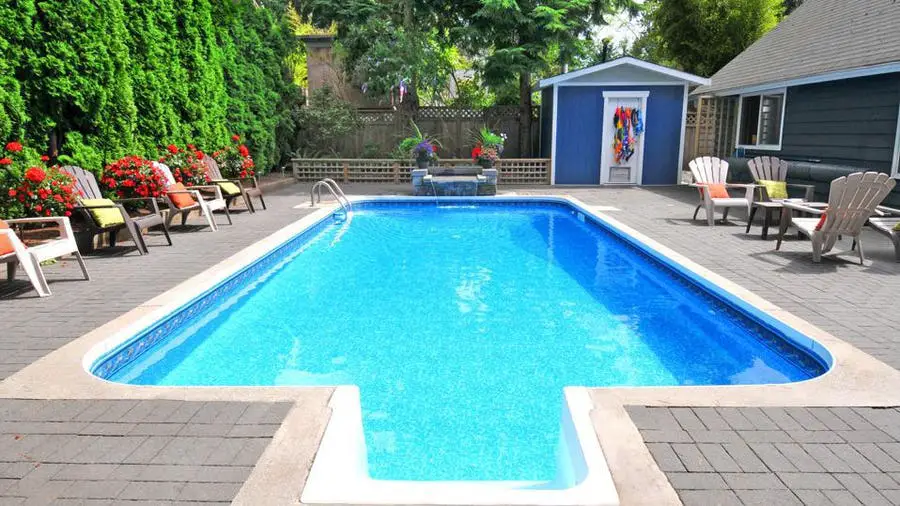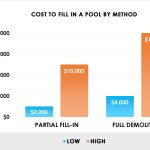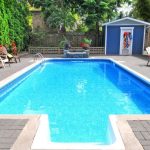The cost of installing a pool varies, but it can range from $20,000 to $100,000. Building a pool involves expenses such as excavation, construction, permits, materials, labor, and additional features like lighting or fencing.
Consequently, the final cost depends on factors such as pool size, shape, type, material, location, and any customization desired. Following a detailed design consultation and getting multiple quotes from reputable pool contractors will give a better idea of the specific costs involved.
However, it is important to note that ongoing maintenance expenses should also be considered when budgeting for a pool installation.

Credit: pardeeproperties.com
Factors Affecting Pool Installation Cost
Installing a pool is an exciting investment that can significantly enhance your outdoor living space and increase the value of your property. However, the cost of pool installation can vary depending on several factors. Understanding these factors can help you make an informed decision and budget accordingly.
Size Of The Pool
The size of the pool is a major determinant of the installation cost. Larger pools require more materials, labor, and time to install, leading to higher overall costs. In contrast, smaller pools generally cost less to install due to their reduced requirements for materials and excavation.
Type Of Pool
The type of pool you choose will also impact the overall cost of installation. In-ground pools tend to be more expensive compared to above-ground pools due to the excavation, construction, and landscaping involved. Additionally, factors such as the materials used, such as fiberglass, vinyl, or concrete, can also influence the cost of installation.

Credit: homeguide.com
Preliminary Expenses
Site Evaluation And Permitting
Before installing a pool, a thorough site evaluation is necessary to assess the land and obtain permits from the local authorities.
Design And Planning
Creating a detailed design and planning the pool layout is crucial for a successful installation process.
Construction Costs
When it comes to installing a pool, one of the crucial factors to consider is the construction costs. These costs encompass various aspects such as excavation and site preparation, as well as the materials and equipment needed for the pool installation.
Excavation And Site Preparation
Before the actual pool installation takes place, proper excavation and site preparation are vital to ensure a sturdy and well-functioning pool. The excavation process involves digging into the ground to create the pool’s foundation. This step is crucial as it sets the stage for the rest of the construction process.
Materials And Equipment
The materials and equipment required for a pool construction project can significantly affect the overall cost. These include the pool shell, plumbing systems, filtration and circulation systems, electrical connections, and more. It’s important to choose high-quality materials and equipment that align with your budget and preferences.
Here’s a breakdown of the materials and equipment commonly needed for pool installation:
| Materials | Estimated Costs |
|---|---|
| Pool Shell | $$$, depending on the material chosen |
| Plumbing Systems | $$ |
| Filtration and Circulation Systems | $$ |
| Electrical Connections | $$ |
| Pool Decking | $$$, depending on the material chosen |
Keep in mind that these costs can vary depending on the size, shape, and complexity of your desired pool design. Additionally, labor costs for installing the materials and equipment should also be considered.
In conclusion, when planning your pool installation, it’s essential to factor in the construction costs, including excavation and site preparation, as well as the materials and equipment needed. By carefully considering each aspect of the construction process and selecting suitable options, you can ensure a smooth and successful pool installation within your budget.

Credit: www.angi.com
Additional Features
When it comes to installing a pool, there are several additional features that can enhance your swimming experience and add value to your investment. These features not only improve the aesthetics of your pool but also contribute to its functionality and maintenance. Two important additional features that you should consider are Decking and Coping, and Filtration and Sanitation Systems.
Decking And Coping
Decking and coping are essential components of a pool that not only add visual appeal but also provide a safe and comfortable area for activities around the pool. The pool deck is the space around the pool where you can place sun loungers, outdoor furniture, and even a BBQ grill. It is crucial to choose a deck material that is slip-resistant and can withstand the elements.
- Concrete Deck: A popular choice due to its durability and versatility. It can be stamped or stained to mimic the look of other materials.
- Pavers: These interlocking stones offer a wide range of design options and are easy to repair or replace if damaged.
- Wood Decking: Provides a natural and warm look, but requires regular maintenance and can be prone to rot and wear.
On the other hand, coping is the finishing touch that goes around the perimeter of the pool. It serves both a functional and aesthetic purpose by providing a smooth edge and protecting the pool’s structure. Common coping materials include:
- Brick: Traditional and durable, brick coping creates a timeless look.
- Poured Concrete: Offers a seamless and customizable option.
- Natural Stone: Provides a luxurious and elegant appearance, but can be more expensive.
Filtration And Sanitation Systems
Filtration and sanitation systems are essential for maintaining a clean and healthy swimming environment. These systems remove debris, bacteria, and other contaminants from the pool water, ensuring that it is safe to swim in. When considering which system to install, you have several options to choose from:
| Filtration System | Advantages | Disadvantages |
|---|---|---|
| Traditional Sand Filter | Low cost, effective for basic filtration | Requires regular backwashing and sand replacement |
| Cartridge Filter | Low maintenance, superior filtration | Higher upfront cost, cartridges need periodic cleaning or replacement |
| Diatomaceous Earth Filter | Finest filtration, ideal for pools with heavy debris | Requires more frequent cleaning and replacement of filter media |
Sanitation systems, such as chlorine generators, saltwater chlorinators, or UV sanitizers, help keep the pool water hygienic and free from harmful bacteria. Each system has its own advantages, so it’s important to choose one that fits your personal preference and budget.
Labor And Installation
The cost of pool installation varies based on factors such as size and materials used. Labor costs are generally a significant portion of the overall expense, with skilled professionals ensuring proper installation. It’s important to budget for both materials and labor when planning to install a pool.
Professional Installation
When it comes to installing a pool, hiring professionals is crucial for a successful and hassle-free experience. Professionals have the knowledge and expertise to handle the intricacies of pool installation, ensuring that everything is done correctly and to code.
The cost of professional installation can vary depending on several factors, including the size and type of pool, site conditions, and the complexity of the project. It is recommended to contact at least three reputable pool builders or contractors and compare their quotes before making a decision.
The average cost of professional installation typically ranges from $20,000 to $50,000, which includes labor and materials. However, it’s important to note that this is just a general estimate, and the actual cost can be significantly higher for larger or more elaborate pools.
Electrical And Plumbing
Electrical and plumbing work are essential components of pool installation. These tasks involve connecting the pool to the existing electrical grid and plumbing system, ensuring proper functioning and safety.
The cost of electrical and plumbing work can vary depending on factors such as the distance from the main electrical panel or plumbing lines, the complexity of the job, and the need for any additional features like lighting or waterfalls.
On average, homeowners can expect to spend around $3,000 to $5,000 for electrical and plumbing work related to pool installation. It’s crucial to hire licensed electricians and plumbers to handle these tasks to ensure compliance with building codes and prevent any issues down the line. Remember, safety should always be a top priority when it comes to electrical and plumbing work.
Unexpected Expenses
Installing a pool can cost anywhere from $30,000 to $100,000, depending on the type and size. However, unexpected expenses such as landscaping, fencing, and maintenance can add another 20% to 100% to the total cost. It’s crucial to budget accordingly for these additional costs when considering a pool installation.
Unexpected Expenses When budgeting for a pool installation project, it’s crucial to consider potential unexpected expenses that may arise. These costs can catch homeowners off guard and impact the overall budget significantly. Being prepared for such unforeseen expenses is essential for a smooth and successful pool installation process. Unforeseen Complications Unforeseen complications during pool installation can lead to additional expenses. Factors such as unsuitable soil conditions, the presence of underground utilities, or environmental factors may necessitate modifications to the initial construction plan, resulting in extra costs. Permit Modifications Obtaining the necessary permits for pool installation is a crucial step. However, permit modifications may be required if changes to the original design or construction plans arise. These modifications can incur additional fees, impacting the overall cost of the project. In conclusion, budgeting for a pool installation should include a buffer for unexpected expenses to accommodate potential unforeseen complications and permit modifications. Being financially prepared for these additional costs can help ensure a smoother and more successful pool installation process.
Maintenance And Operating Costs
When it comes to the cost of installing a pool, it’s important to consider the ongoing maintenance and operating expenses. Understanding the potential costs associated with pool maintenance can help you make an informed decision about whether a pool is an affordable option for your household.
Chemicals And Cleaning
Pool maintenance often involves the regular purchase of essential chemicals and cleaning supplies to keep the water clean and safe for swimmers. Items such as chlorine, algaecides, pH balancers, and cleaning tools can add to the annual maintenance expenses. Additionally, the cost of professional pool cleaning services may also need to be factored in, especially if you lack the time or expertise to maintain the pool on your own.
Energy Consumption
The operating costs of a pool also include the energy consumption required to power the filtration system, heaters, and pumps. These can significantly contribute to your monthly utility bills, particularly during peak seasons when the pool is in frequent use.
Long-term Financial Implications
Installing a pool can lead to substantial long-term financial implications. The overall cost depends on factors such as pool size, materials, and additional features. Proper research and budgeting are crucial in understanding the financial commitment of pool installation.
Installing a pool comes with long-term financial implications that extend beyond the initial installation costs. These factors can significantly impact your overall financial situation in the years to come.
Insurance And Tax Increase
– Pools can lead to an increase in home insurance premiums. – The property taxes on your home may also rise with the addition of a pool. – Pools are considered an attractive nuisance, which can potentially increase liability risk.
Resale Value Impact
– Pools can enhance the resale value of your home, particularly in warmer climates. – However, not all potential homebuyers may be willing to pay extra for a pool. – Consider the local market trends and preferences when assessing the impact on resale value.
Conclusion
Installing a pool can range from basic to luxurious, with costs varying based on size and materials. Ensure to consider maintenance fees for a clear pool budget. Ultimately, the joy and relaxation a pool can bring often outweigh the initial investment.
Dive in!





